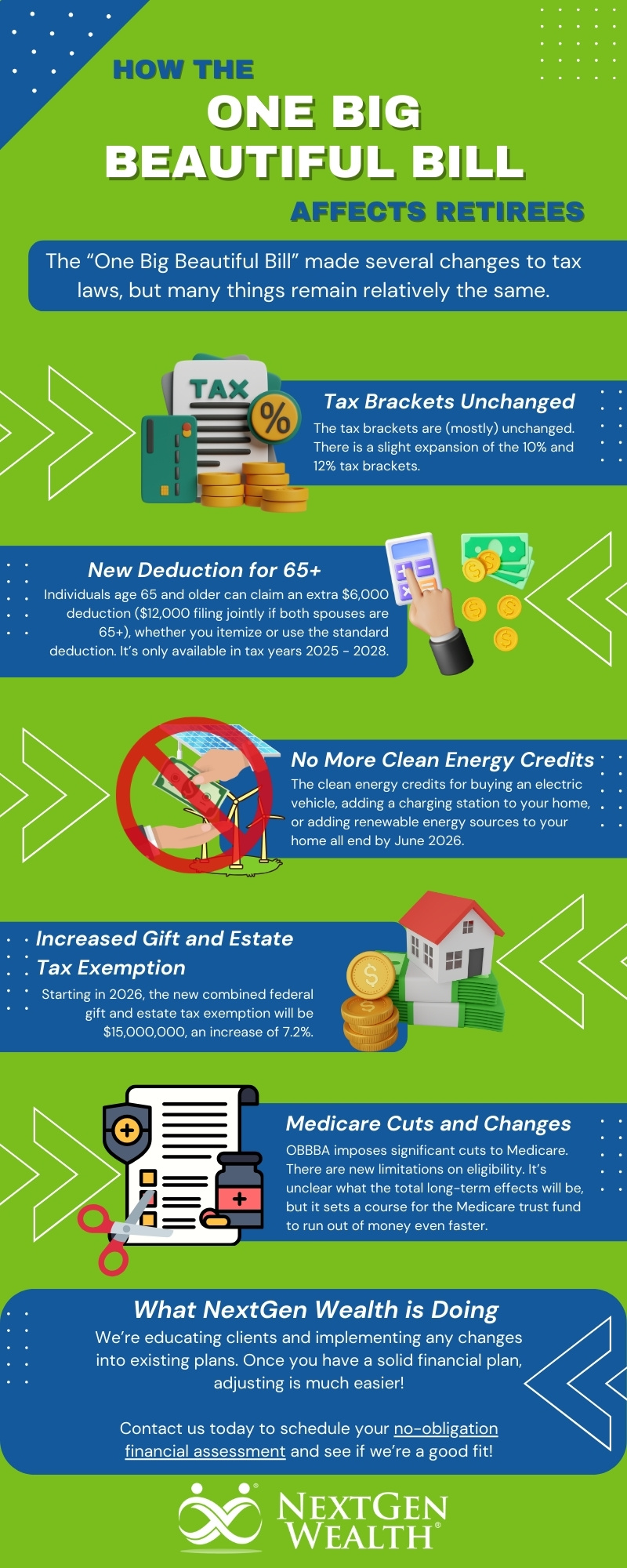How The One Big Beautiful Bill Affects Retirees

There’s a ton of noise out there regarding the One Big Beautiful Bill. But how does it affect retirees? For many retirees, there won’t be any major game changers, but there are some key changes you need to know.
Fortunately, there are no significant changes to tax bracket structures. However, there were several changes to standard and itemized deductions, as well as increased gift and estate tax exemptions. We also get some new deductions, lose others, and see many modified credits, deductions, and phase-outs.
Table of Contents
Key Provisions Impacting Retirees
Some of the biggest questions about taxes moving forward with the potential sunset of the Tax Cuts and Jobs Act (TCJA) have been laid to rest. Tax brackets will be permanently set at the current thresholds with minor changes to the 10% and 12% tax brackets. There doesn’t appear to be any significant changes to retirement account rules and distributions.
However, there are several changes to tax deductions, including a new deduction of up to $6,000 per person for individuals aged 65 and older. There are also significant changes to clean energy and clean vehicle credits, which take effect almost immediately.
Retirement Income & Savings
Luckily, there aren’t any significant changes to retirement accounts, Required Minimum Distributions (RMD) rules, IRA/401(k) contribution limits, or catch-up provisions. A new type of IRA, called “Trump Accounts,” was created, but these are intended for individuals under 18.
Healthcare & Long-Term Care Changes
There are several key changes to the Affordable Care Act (ACA) and Medicaid eligibility requirements. These could affect early retirees the most.
ACA Changes
The current Affordable Care Act (ACA) premium tax credits are used to offset the costs of coverage. However, they’re set to expire at the end of 2025. The OBBBA did not extend these credits.
The result will be an increase in premiums for many people on Marketplace plans. There are also changes to eligibility, enrollment periods, and verification procedures for eligibility.
Medicare Changes
The new law imposes significant cuts to Medicare over the next nine years. There are also new limitations on eligibility. It’s unclear what the total long-term effects will be, but the bill will set a course for the Medicare trust fund to run out of money even faster.
States will now need to determine how to implement the new provisions. We’ll need to see if any additional legislation for Medicare is enacted.
Expansion of Health Savings Account Eligibility
There are now expanded definitions of plans that qualify for Health Savings Account (HSA) eligibility. This means more people may be eligible for an HSA. The new rules allow for people with Marketplace Bronze or Catastrophic health plans to qualify.
HSAs are a great account with triple-tax savings. The money you contribute is tax-deductible, it grows tax-free, and the money you withdraw is tax-free if used for qualifying expenses. You can use an HSA as an additional retirement account once you turn 65.
Tax Changes and Income Strategy
The current tax brackets temporarily set by the Tax Cuts and Jobs Act (TCJA) are now made “permanent.” We put the word permanent in quotations because nothing is permanent when it comes to tax laws. These brackets are just set in place until they’re changed again by the next major tax overhaul.
We’re also keeping the larger standard deduction and many expanded deductions, but some, like the expanded Child Tax Credit, won’t affect retirees.
New and Modified Tax Deductions
We do get some modifications to many tax deductions, which may benefit retirees. There are some deductions which are specifically tailored for people 65 years and older.
New Age 65 and Older Deduction
For individuals age 65 and older, you can claim an extra $6,000 deduction. This is whether you itemize or use the standard deduction. If you file jointly and both spouses are age 65 by the end of the tax year, you can claim up to $12,000 total.
The new deduction is temporary and can only be claimed in tax years 2025 through 2028. There’s also a phaseout for single filers with a modified adjusted gross income (MAGI) of $75,000 or $150,000 MAGI for a couple filing jointly. The deduction is reduced by 6% of the amount exceeding those limits.
In other words, the credit is completely phased out for incomes exceeding $175,000 MAGI for single filers and $350,000 for married filing jointly when both spouses qualify. Social Security numbers must be provided for each eligible taxpayer to receive the deduction.
Charitable Contributions
Before, you needed to either itemize deductions or use a “bunching” strategy to get a tax deduction for charitable contributions. The new law allows taxpayers who use the standard deduction to claim an additional deduction of up to $1,000 (single) or $2,000 (married filing jointly). This could be a great way to get credit for donations you’re already making to a qualifying organization.
New Car Loan Interest Deduction
You may be able to deduct auto loan interest payments if you purchased a new car after 31 December 2024. This temporary deduction is in effect through 2028 and has a maximum annual deduction of $10,000. There is also a phase-out for taxpayers with a MAGI of $100,000 ($200,000 married filing jointly) or more.
This offer is exclusive to new vehicles with final assembly in the U.S. It does not include lease payments. For more information, check out the IRS website. It’s essential to remember that this is a deduction, not a credit, so you only receive partial reimbursement for the additional expenses incurred by taking on a loan.
State And Local Tax (SALT) Deduction Changes
The ability to deduct state and local tax (SALT) has temporarily increased to $40,000. For some, this could mean taking a second look at itemizing deductions – especially if you pay a lot in property taxes or state income taxes. The limit was $10,000.
It’s worth discussing with your accountant to revisit whether itemizing is the best option for your situation. This may also need to be coordinated with any other tax-saving strategies you’re currently using.
Alternative Minimum Tax Changes
For high-income earners, it’s essential to monitor the alternative minimum tax (AMT) changes. In short, the AMT exemptions remain unchanged, but there are adjustments to the phase-outs. The rate of phase-outs for exemptions increased from 25% to 50%.
In other words, more people may be subject to the AMT. Once again, check with your accountant and financial planner to plan for any potential impacts.
No More Clean Energy Credits
One major area where tax deductions and credits are negatively affected is the clean vehicle and clean energy credits. If you plan to buy an electric vehicle, add a charging station to your home, or incorporate renewable energy sources into your home, time is quickly running out for the current tax credits.
All these end within the following year. Be sure to check the specifics of each for the timeline for purchase and installation.
Estate Planning Changes
There aren’t many items that significantly affect estate planning, but there is an increased gift and estate tax exemption.
Increased Gift and Estate Tax Exemption
Starting in 2026, the new combined gift and estate tax exemption will be $15,000,000. This will be indexed for inflation each year as well. The exemption for 2025 is currently set at $13,990,000. The new exemption limit represents a 7.2% increase.
Keep in mind that this applies only to federal estate and gift taxes. You’ll still need to pay attention to state exemption limits. Note: Missouri does not currently impose an estate tax.
How NextGen Wealth is Helping Clients with Changes
There’s nothing new about what we’re doing at NextGen Wealth. We’ll continue to educate clients on changes that impact them and implement any necessary changes into their existing plans. Once you have a solid financial plan, adjusting is much easier.
We’re systematically making changes to ensure we’ve got all bases covered. For this new law, we’re reviewing withdrawal strategies, healthcare coverage, updating tax planning, estate planning strategies, and marking down key dates for action.
Contact us today to schedule your no-obligation financial assessment and see if we’re a good fit.



